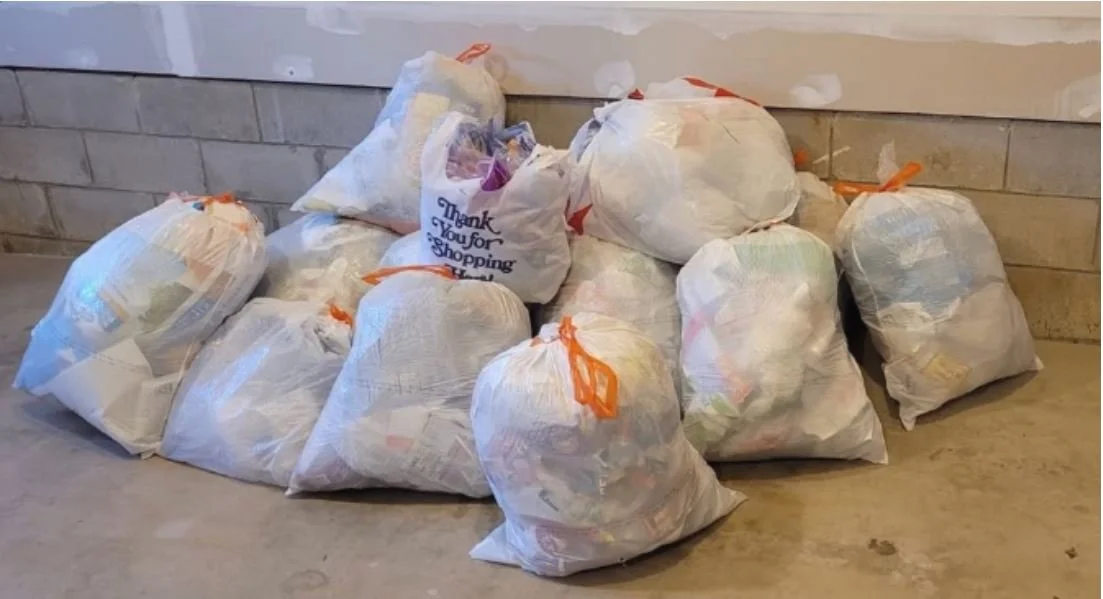Tech for Trash: Data-Driven Solutions for Plastic Recycling
Written by Tanisha Khabe, 2025 Machine Learning and Data Science Intern
Over 20 garbage bags filled with plastic were piled up in a corner of my family’s garage, containing everything from clamshell containers to bubble wrap and plastic grocery bags.
During my later high school years, I initiated plastic collection drives in my school and local community. Through organizing awareness campaigns to encourage friends and family to drop off their plastic waste and set up collection bins at various locations, including my home, my goal was to make recycling easy and trustworthy for my community. While I didn’t fully understand the recycling process, I was dedicated to helping by collecting plastic waste and ensuring it was properly disposed of at local recycling centers.
Some of the plastic I collected during the recycling drive in high school!
Bringing my recycling experience to Reclamation Factory
From my experience collecting plastics in high school as a volunteer initiative, I spent this summer interning at Reclamation Factory, an eco-tech startup, whose mission is to consolidate and automate the plastics reclamation process through advanced machine vision and automation systems. As a data science and machine learning intern, I have been involved with several different projects supporting Reclamation Factory’s behind-the-scenes automation and various product offerings.
My main project this summer was the data processing, cleaning, and statistical analysis of the plastic data that RecFac had collected this year through the PGH Lab 10 pilot program. I designed Python data flows and configured Amazon Web Services to analyze and model the entry-to-exit pathway of a single piece of plastic, from labeling the plastic at the collection site to identifying its appropriate diversion pathway. Additionally, I contributed to a multi-modal plastic identification and classification system, which involved feature engineering and machine learning. As a result, our team achieved an accuracy of up to 93% in identifying plastic by analyzing its resin type and form factor.
Modeling waste origin and destination with the data we collected in the PGH Lab pilot.
One particularly exciting experience was working directly in RecFac’s warehouse, where I observed how plastics were stored, tracked, and sorted, as well as how units such as weight and spectroscopy are measured. It has been enlightening to see the behind-the-scenes factors at play that determine whether something can be recycled. Additionally, to support my work throughout the summer to enhance my understanding, I conducted research on plastics, resin types, and various local recycling requirements, which has made me more environmentally conscious overall.
Throughout this experience, I also noticed how fostering strong relationships is crucial when forming client partnerships for material audits, automation services, and understanding how we can help their businesses. One key approach is to sit down with clients to understand their pain points in the recycling process, as well as what motivates or demotivates them in their recycling efforts.
Actively engaging with clients significantly enhanced our collaboration and led to better outcomes and efficient product development. Creating a comprehensive product requirements document, designing intuitive data visualizations, and establishing custom metrics based on client feedback are essential steps for achieving success in areas such as developing prototype material audits. Through such collaborative efforts, we can continue to drive meaningful change in the recycling industry.
Taking my experience into the future
From gathering plastics for collection in high school to quantitatively analyzing data derived from such collections, I am thrilled to have made a real-world impact through my data and machine learning work. I have learned how to tackle messy datasets, transforming them into understandable formats to extract insights. I look forward to applying my skills in data analytics, visualization, building neural networks, and presenting data to stakeholders.
This experience has also taught me a great deal about community and client partnerships. In my future work, I hope to carry forward a mission-driven, client-first mindset, enabling me to understand community and client needs and translate them into actionable products and services.
My key takeaways:
Be curious about how systems and processes work and how we can improve them using our technical skills.
Take the time to understand the communities affected by these processes. What specific problems are they facing?
Understand the scientific and technical nature of the issues at hand. Conduct research and look things up as needed to support your automation.
I’m incredibly grateful for my experience at the Reclamation Factory and look forward to continuing to drive change through responsible technology.
You can also read this article on Tanisha’s personal blog here.


